Artificial Intelligence (AI) is no longer a buzzword—it’s the backbone of business growth. From automating processes to predicting customer needs, AI is transforming how B2B companies in India operate. But the key question is: who is adopting AI, and who is truly winning from it?
In this blog, we break down the adoption trends, industries leading the way, and the measurable impact of AI in India’s B2B landscape.
Why AI in B2B Is Not Optional Anymore
According to a NASSCOM report (2024), the Indian AI market is expected to reach USD 17 billion by 2027, growing at a CAGR of 25–30%. What was once a futuristic concept has become a competitive necessity, especially in the B2B ecosystem where efficiency and decision-making speed determine market leadership.
- 60% of Indian mid-to-large enterprises report that AI is already embedded in at least one core business function.
- 87% of CEOs surveyed by PwC India believe AI adoption gives them a competitive edge in data-driven decision making.
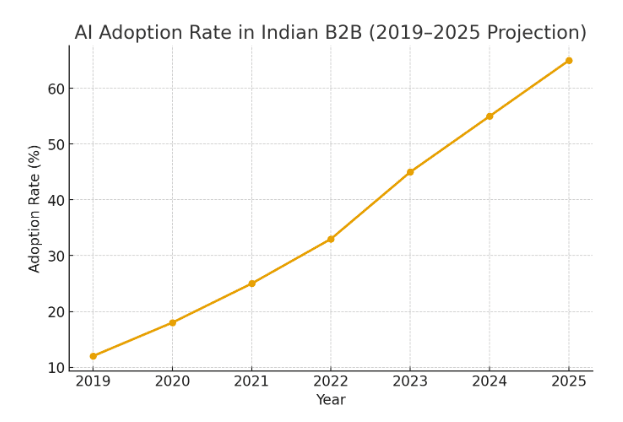
Who’s Adopting AI in Indian B2B?
Not all industries are moving at the same speed. Based on recent adoption data:
- Manufacturing (38%) – Using AI for predictive maintenance, supply chain automation, and quality control.
- IT & SaaS (32%) – Leveraging AI for product personalization, workflow automation, and client service optimization.
- Financial Services (27%) – AI in fraud detection, credit scoring, and portfolio management.
- Healthcare (19%) – Accelerating drug discovery, diagnostics, and patient engagement tools.
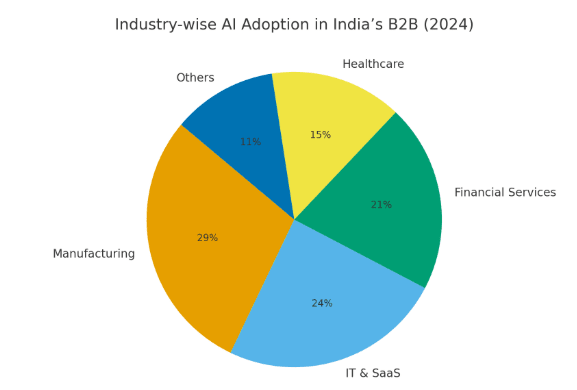
Interestingly, MSMEs are catching up fast. While larger enterprises led the first wave, MSMEs now see AI-driven insights as a way to bridge resource gaps and compete with bigger players.
Who’s Winning with AI?
Adopting AI is one thing, but leveraging it effectively is another. Companies that are winning with AI in India share some common traits:
- Data-Driven Operations: Firms with robust, clean databases gain faster and more accurate AI outputs.
- Customer-Centric AI: Businesses using AI to personalize B2B sales experiences report up to 30% higher conversion rates.
- Efficiency Gains: AI-driven automation can reduce operational costs by 20–40%, freeing resources for strategy and innovation.
- Speed to Market: AI-led predictive analytics shortens product launch cycles by 25–35%.
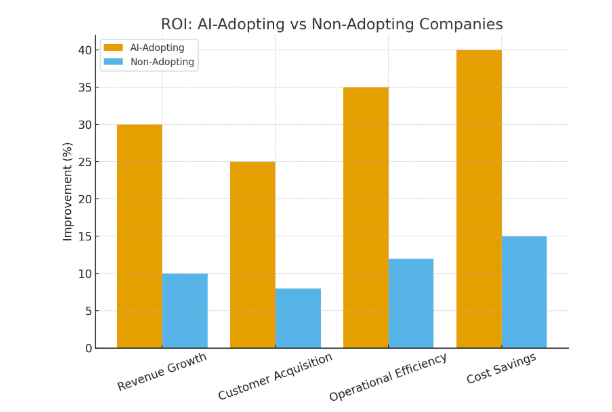
The MSME Opportunity in AI
India has 63 million+ MSMEs, contributing nearly 30% of India’s GDP. Yet, AI adoption in this segment is still under 10%.
This gap represents a massive opportunity:
- MSMEs that adopt AI early stand to capture market share from slower competitors.
- Affordable cloud-based AI tools (like CRM integrations, chatbots, lead-scoring systems) mean MSMEs no longer need enterprise-level budgets to compete.
👉 According to McKinsey, MSMEs implementing AI-led data insights can expect 15–20% growth in customer acquisition efficiency.
| Year | MSME AI Adoption Rate (%) |
|---|---|
| 2025 | 8% |
| 2026 | 12% |
| 2027 | 18% |
| 2028 | 25% |
| 2029 | 33% |
| 2030 | 42% |
What This Means for Indian Business Owners
For B2B decision-makers, AI is no longer about “should we adopt it” but “how fast can we adopt it to stay ahead.”
- If you’re in manufacturing: Predictive maintenance and AI-powered supply chain visibility can save millions.
- If you’re in IT/SaaS: AI can increase customer retention and reduce churn.
- If you’re in finance: Real-time fraud detection is becoming a non-negotiable.
- If you’re in MSME: AI-powered datasets and insights can level the playing field with corporates.
Final Thoughts
The AI revolution in Indian B2B is not evenly distributed—yet. Early adopters are already reaping measurable rewards in profitability, efficiency, and customer acquisition. The next two years will decide who leads and who lags.
At EMarket Zone, we believe the foundation of AI success lies in verified, high-quality business data. Without clean and structured data, even the most advanced AI tools underperform. That’s why we continue to empower Indian businesses with reliable datasets that fuel smarter decisions.
🚀 The winners of tomorrow’s B2B landscape will be those who embrace AI today—with the right data at their core.

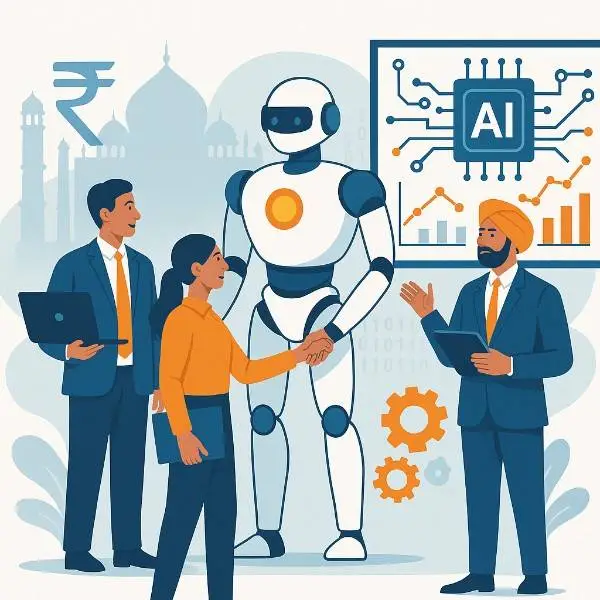

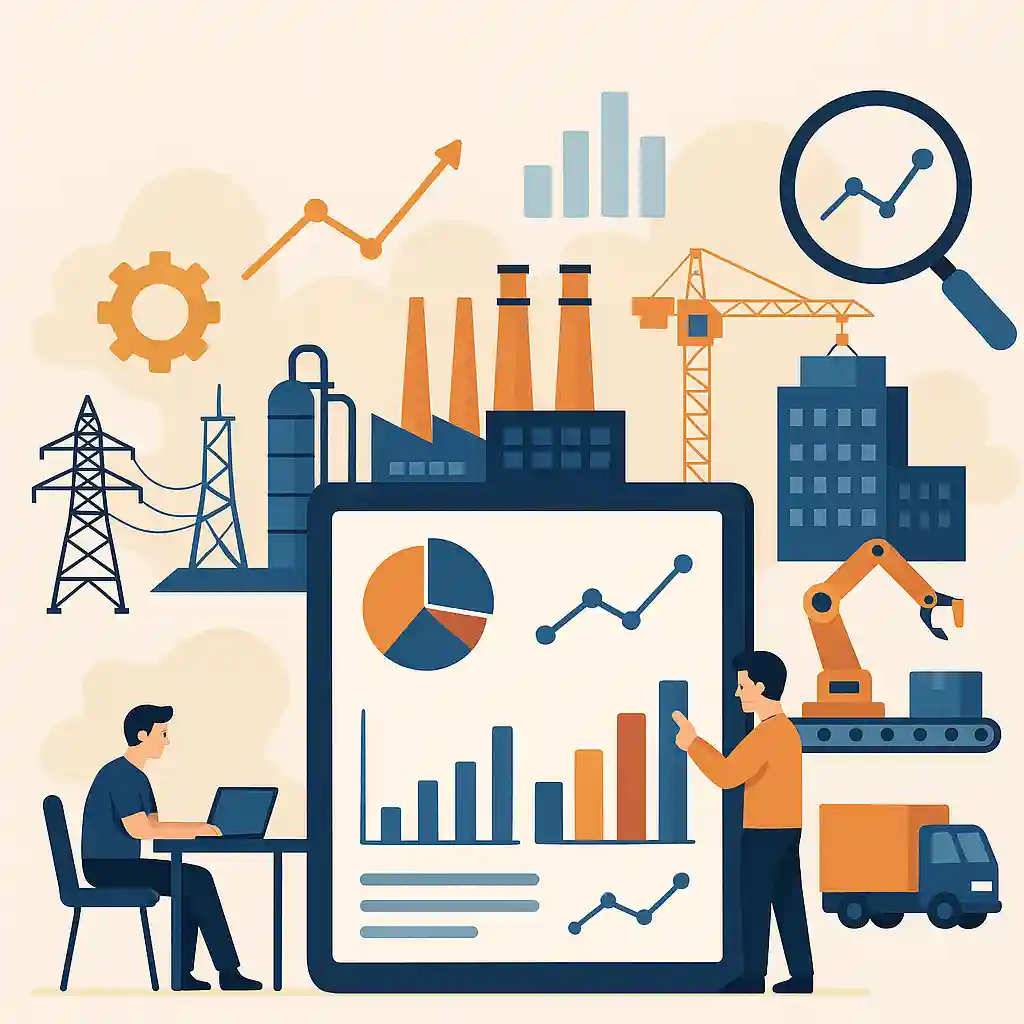
Leave a comment